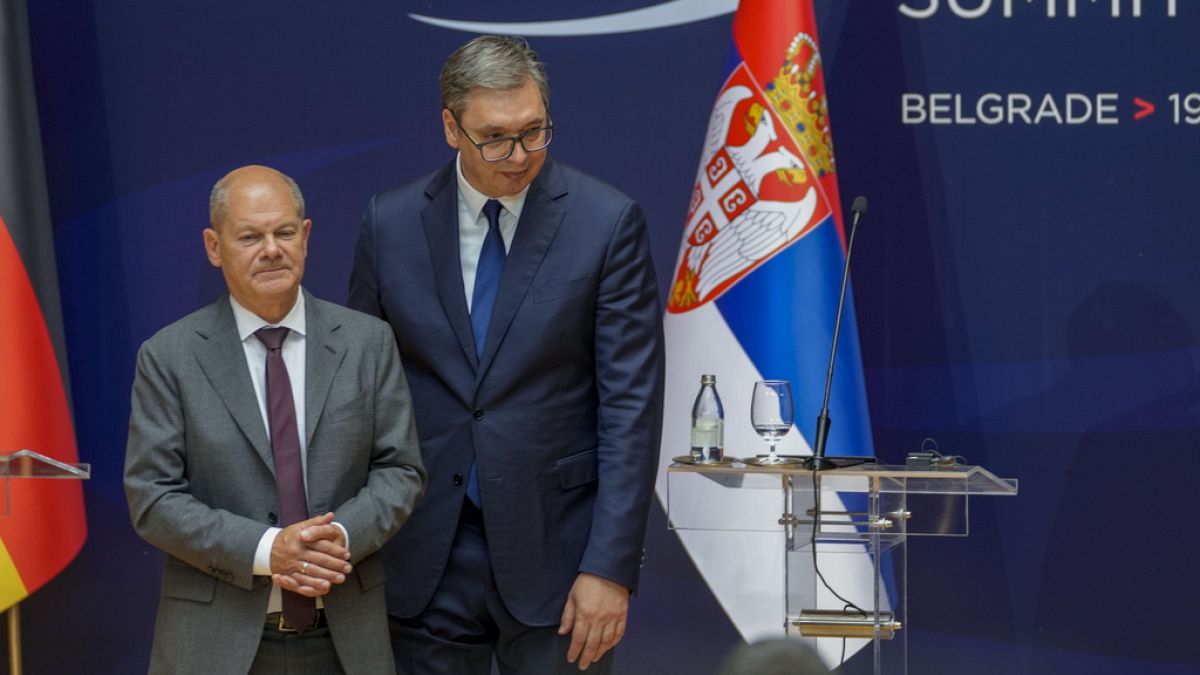
Copyright Darko Vojinovic/Copyright 2024 The AP. All rights reserved
By Robert Hodgson
Published on 19/07/2024
Brussels has signed a cooperation agreement with Serbia on the supply of critical raw materials, in a move that is also seen as a pivot by the Balkan nation, traditionally an ally of Russia, towards the EU.
European Commission Vice President Maroš Šefčovič has inked a strategic partnership with Serbian President Aleksandar Vučić that the EU hopes will give it access to large supplies of lithium, a key strategic raw material essential for the energy transition and in developing a domestic electric vehicle industry.
Under the memorandum of understanding, signed today at a critical raw materials summit in Belgrade attended by German Chancellor Olaf Scholz, the EU and Serbia agree to facilitate “close cooperation between EU and Serbian industrial actors and stakeholders” to build up supply chains for raw materials, batteries and EVs.
They also undertake to build up R&D and workforce skills and mobilise investment through a number of EU instruments: Invest EU, the Western Balkans Investment Framework and a Single Project Pipeline in Serbia, and through the Commission’s European Raw Materials Alliance and European Battery Alliance.
“Application of high environmental, social and governance standards and practices will be facilitated through mutual consultation and exchange of information on relevant policies and initiatives along the entire value chains, including through the application of increased due diligence and traceability for the battery value chain,” the EU executive said in a statement.
The deal comes just days after the Vučić government gave the go-ahead for a disputed mining project backed by the Anglo-Australian mining conglomerate Rio Tinto near Loznica, some 100 kilometres west of the capital Belgrade.
The Jadar Valley mining project, which Rio Tinto describes as ‘potentially one of the world’s largest greenfield lithium projects’ was halted in early 2022 after vocal protests over its feared environmental impact.
Why is lithium crucial to the EU's green and digital transition?
But it now looks set to go ahead after Serbia’s constitutional court ruled on 11 July that the government’s decision to revoke the licence was unconstitutional. Renewed protests in the days ahead of the ruling saw several arrests, according to local media reports.
Friday's agreement is seen as a part of a pivot towards the EU by a Serbian government that just five months ago was censured by the European Parliament in a resolution expressing concern about the conduct of general elections in December and the country’s close ties with Russia. Serbia has also been courted by China with a view to accessing its important lithium reserves.
Šefčovič said it was a testament to a “shared commitment” to drive forward the green transition. “Through strategic collaboration in these key sectors, we unlock immense potential for sustainable growth and innovation, while also enhancing Serbia’s integration with the EU’s single market and further boosting its economic, social and environmental convergence with the EU,” he said.
Enlargement Commissioner Olivér Várhelyi said the agreement “reaffirms Serbia's EU path.” The Balkan country signed the Stabilisation and Association Agreement with Brussels in 2013, but it has made halting progress towards aligning with EU norms in areas ranging from environmental protection to judicial independence since then.
The memorandum of understanding with Serbia, the 14th such EU partnership on raw materials, follows the signing of a letter of intent last September by Šefčovič with a view to closer cooperation and bolstering supply chains for electric vehicle manufacture.
Commission clinches raw materials deal with Australia
Lithium’s green potential fails to defuse Europe’s opposition to mining
Chancellor Scholz was at the summit to offer German support for investment in the lithium value chain, which would bring “billions of investments and incredible progress for the entire country”, Vučić was quoted as saying by Belgrade radio station B92.
Speaking to reporters in the UK yesterday after meeting some 40 heads of state and government at the European Political Community summit in Blenheim Place, Scholz said Europe “cannot complain that certain mining and processing of minerals are concentrated in a few countries, especially a very large country in the East” while refusing to exploit its own resources.
Referring to renewed commitments that any risk from the mining project would be minimised, the German chancellor said the lithium would be extracted “under the best conditions imaginable, namely by doing it so precisely and well that it avoids adverse effects on the environment.”
No comments:
Post a Comment